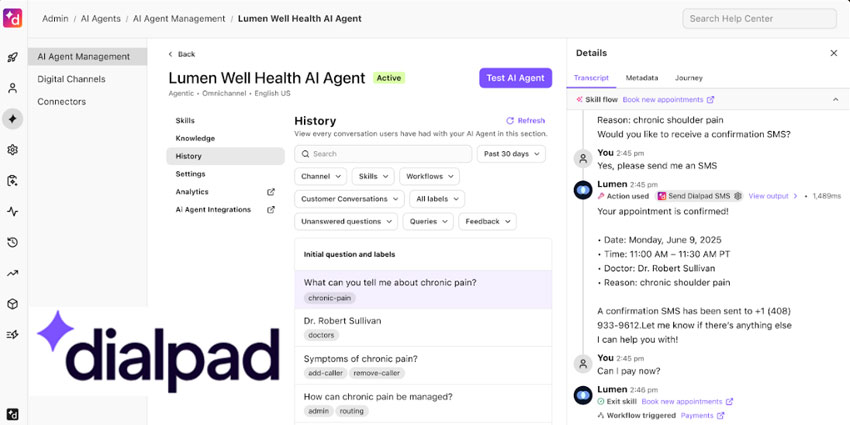Dialpad has launched a “world-first” agentic AI Platform, which it believes will “define the future of customer service”.
The agentic AI Platform promises to deliver autonomous voice and chat agents that go beyond the generative-AI-infused chatbots that many contact centers have deployed to retrieve answers from knowledge and data sources.
Instead, they reason, adapt, and take actions across business systems, as a human agent would, to automate longer tail resolution flows.
The likes of NiCE, Genesys, and Five9 have made similar AI agent announcements. However, in delivering a single platform for building and deploying these agents, which continually learn over time, Dialpad hopes it will lead the charge into the next era of customer service.
As Craig Walker, CEO and Founder of Dialpad, said: “While ‘competitors’ continue to offer basic FAQ retrieval systems and play digital librarian, we’re delivering AI that executes.
This isn’t incremental improvement – it’s architectural transformation that’s defining the new era of customer experience.
Driving home the significance of the transition from passive retrieval to autonomous action, Dialpad claimed its agentic AI Platform can resolve between 60-70 percent of customer requests on the first day.
To help customers achieve this, it plans to support customers in orchestrating AI agent-led resolution flows for many of their most common contact reasons, helping brands gain confidence in the technology. That includes managing refund requests, scheduling appointments, tracking orders, and more.
Dialpad has also built the AI agents directly into its enterprise communications platform, allowing businesses to deploy them across any channel and simplifying integration for contact centers adopting the technology.
Also, the vendor promises that if its AI agents are unsure of which resolution path to follow, they’ll escalate immediately to a live agent, who receives the full conversation context.
However, in theory, these escalations should decrease over time, as the AI agents learn, follow the lead of high-performing reps, and start driving improved customer outcomes.
That’s not to say that customers should be hesitant to dive in more quickly, per Shezan Kazi, Head of AI Innovation at Dialpad.
“Organizations don’t just need AI that can act—they need AI they can trust to act,” he said.
Our platform layers in policy enforcement, PII redaction, and real-time safety monitoring so businesses can deploy with confidence. This isn’t about deploying fast and fixing later, it’s about getting it right from day one.
That platform is now available as part of an Early Access Program (EAP) for existing customers, with Dialpad opening up broader access later this month.
So… What Exactly Is Included in Dialpad’s Agentic AI Platform?
Essentially, the Dialpad agentic AI Platform has five core pillars. The first is a “Dynamic Intelligence Architecture”, which provides a “unified data plane”, which ensures AI can learn from every contact center interaction.
Next is an agent development studio, where users can build and test agents without needing code, with sandbox simulations and “built-in” intelligence.
Third, there is a context continuity feature, which ensures that – when interactions shift channels and escalate to human reps – the context of the conversation and resolution process so far moves with them.
Fourth is “trust by design”. This embeds “policy enforcement, PII redaction, and real-time safety monitoring” into the platform, so brands can more confidently scale the implementation of AI agents.
Finally, there’s a conversational intelligence element, too. Dialpad’s solution spans AI and human agent conversations, surfacing data, and allowing leaders to interact with that data through natural language. With this capability, the vendor hopes to eliminate the need for data science expertise and complex dashboards.
The convergence of next-generation conversational AI and conversational intelligence is a fascinating trend, explored in the recent Opus Research Conversational AI / Self-Service Intelliview 2025 report.

